情态动词 完成时
情态动词+完成时
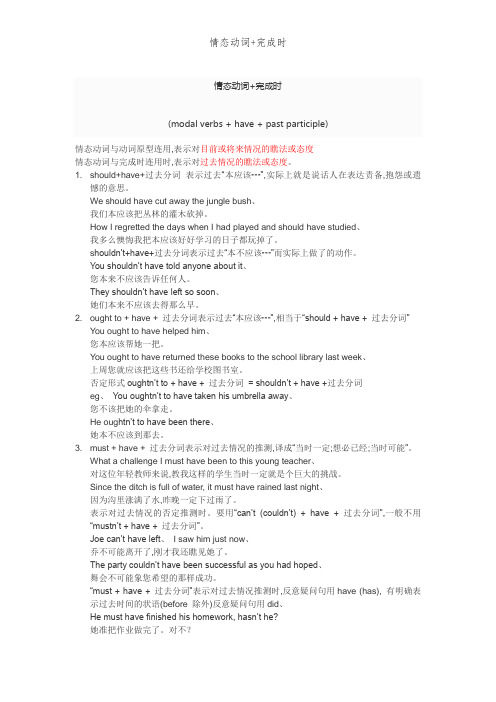
情态动词+完成时(modal verbs + have + past participle)情态动词与动词原型连用,表示对目前或将来情况的瞧法或态度情态动词与完成时连用时,表示对过去情况的瞧法或态度。
1. should+have+过去分词表示过去“本应该┅”,实际上就是说话人在表达责备,抱怨或遗憾的意思。
We should have cut away the jungle bush、我们本应该把丛林的灌木砍掉。
How I regretted the days when I had played and should have studied、我多么懊悔我把本应该好好学习的日子都玩掉了。
s houldn’t+have+过去分词表示过去“本不应该┅”而实际上做了的动作。
You shouldn’t have told anyone about it、您本来不应该告诉任何人。
They shouldn’t have left so soon、她们本来不应该去得那么早。
2. ought to + have + 过去分词表示过去“本应该┅”,相当于“should + have + 过去分词”You ought to have helped him、您本应该帮她一把。
You ought to have returned these books to the school library last week、上周您就应该把这些书还给学校图书室。
否定形式oughtn’t to + have + 过去分词= shouldn’t + have +过去分词eg、You oughtn’t to have taken his umbrella away、您不该把她的伞拿走。
He oug htn’t to have been there、她本不应该到那去。
3. must + have + 过去分词表示对过去情况的推测,译成“当时一定;想必已经;当时可能”。
情态动词完成时的用法
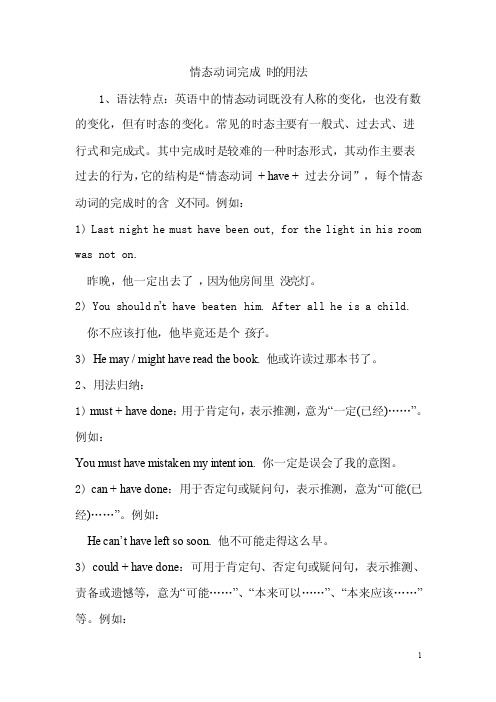
情态动词完成时的用法1、语法特点:英语中的情态动词既没有人称的变化,也没有数的变化,但有时态的变化。
常见的时态主要有一般式、过去式、进行式和完成式。
其中完成时是较难的一种时态形式,其动作主要表过去的行为,它的结构是“情态动词+ have + 过去分词”,每个情态动词的完成时的含义不同。
例如:1) Last night he must have been out, for the light in his room was not on.昨晚,他一定出去了,因为他房间里没亮灯。
2) You shouldn’t have beatenhim. After all he is a child. 你不应该打他,他毕竟还是个孩子。
3) He may / might have read the book. 他或许读过那本书了。
2、用法归纳:1) must + have done:用于肯定句,表示推测,意为“一定(已经)……”。
例如:You must have mistake n my intenti on. 你一定是误会了我的意图。
2) can + have done:用于否定句或疑问句,表示推测,意为“可能(已经)……”。
例如:Hecan’thaveleftsosoon.他不可能走得这么早。
3) could + have done:可用于肯定句、否定句或疑问句,表示推测、责备或遗憾等,意为“可能……”、“本来可以……”、“本来应该……”等。
例如:We could have walkedto the station , for it was so near .我们本来是可以走到车站去的,因为路很近。
4) should[ought to] + have done:可用于肯定句、否定句或疑问句,表示责备或遗憾等,意为“本来应该……”。
情态动词+have finished用法详解

情态动词+have finished用法详解情态动词+[have finished] 用法详解情态动词是英语中一类特殊的动词,用来表示说话人对某种行为或状态的态度、推测或能力等。
在与完成时态have finished搭配使用时,情态动词的意义会有进一步的延伸和强调。
本文将详细解释情态动词与have finished的用法。
1. "Can have finished"使用情态动词can与have finished搭配,可以表示过去某一时间点或者时间段内的完成行为。
它强调了完成的能力和可能性。
例如:- I can have finished the report by tomorrow. (明天之前,我可能已经完成了报告。
)- She can have finished her homework before dinner. (吃晚饭之前,她可能已经完成了作业。
)2. "Could have finished"情态动词could与have finished的结合,可以表示过去某一时间点或者时间段内本来能够完成,但实际上没有完成的情况。
它强调了对过去事实的揣测和推测。
例如:- He could have finished the project last week, but he got sick. (他上周本来能够完成这个项目,但他生病了。
)- They could have finished the race, but they had an accident. (他们本来能够完成比赛,但他们发生了事故。
)3. "May have finished"使用情态动词may与have finished连用,表示对过去事实的推测和猜测。
它强调了有可能已经完成的情况。
例如:- He may have finished his work before he left. (他可能在离开前已经完成了工作。
must_have_done用法
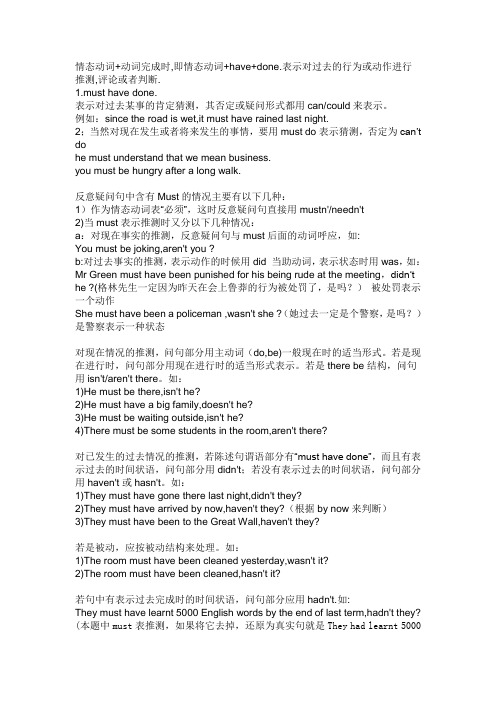
情态动词+动词完成时,即情态动词+have+done.表示对过去的行为或动作进行推测,评论或者判断.1.must have done.表示对过去某事的肯定猜测,其否定或疑问形式都用can/could来表示。
例如:since the road is wet,it must have rained last night.2;当然对现在发生或者将来发生的事情,要用must do表示猜测,否定为can’t dohe must understand that we mean business.you must be hungry after a long walk.反意疑问句中含有Must的情况主要有以下几种:1)作为情态动词表“必须”,这时反意疑问句直接用mustn'/needn't2)当must表示推测时又分以下几种情况:a:对现在事实的推测,反意疑问句与must后面的动词呼应,如:You must be joking,aren't you ?b:对过去事实的推测,表示动作的时候用did 当助动词,表示状态时用was,如:Mr Green must have been punished for his being rude at the meeting,didn‘t he ?(格林先生一定因为昨天在会上鲁莽的行为被处罚了,是吗?)被处罚表示一个动作She must have been a policeman ,wasn't she ?(她过去一定是个警察,是吗?)是警察表示一种状态对现在情况的推测,问句部分用主动词(do,be)一般现在时的适当形式。
若是现在进行时,问句部分用现在进行时的适当形式表示。
若是there be结构,问句用isn't/aren't there。
如:1)He must be there,isn't he?2)He must have a big family,doesn't he?3)He must be waiting outside,isn't he?4)There must be some students in the room,aren't there?对已发生的过去情况的推测,若陈述句谓语部分有“must have done”,而且有表示过去的时间状语,问句部分用didn't;若没有表示过去的时间状语,问句部分用haven't或hasn't。
现在完成时与情态动词
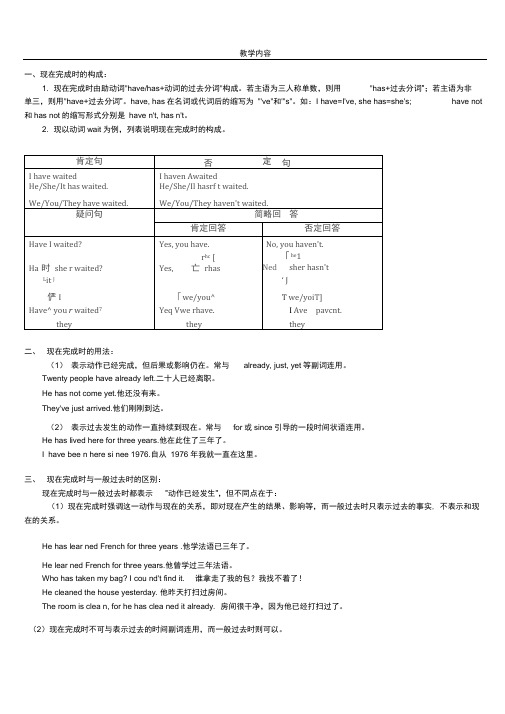
教学内容一、现在完成时的构成:1. 现在完成时由助动词"have/has+动词的过去分词"构成。
若主语为三人称单数,则用"has+过去分词”;若主语为非单三,则用"have+过去分词”。
have, has在名词或代词后的缩写为"'ve"和"'s"。
如:I have=I've, she has=she's; have not 和has not的缩写形式分别是have n't, has n't。
2. 现以动词wait为例,列表说明现在完成时的构成。
二、现在完成时的用法:(1)表示动作已经完成,但后果或影响仍在。
常与already, just, yet等副词连用。
Twenty people have already left.二十人已经离职。
He has not come yet.他还没有来。
They've just arrived.他们刚刚到达。
(2)表示过去发生的动作一直持续到现在。
常与for或since引导的一段时间状语连用。
He has lived here for three years.他在此住了三年了。
I have bee n here si nee 1976.自从1976 年我就一直在这里。
三、现在完成时与一般过去时的区别:现在完成时与一般过去时都表示”动作已经发生”,但不同点在于:(1)现在完成时强调这一动作与现在的关系,即对现在产生的结果、影响等,而一般过去时只表示过去的事实, 不表示和现在的关系。
He has lear ned French for three years .他学法语已三年了。
He lear ned French for three years.他曾学过三年法语。
Who has taken my bag? I cou nd't find it. 谁拿走了我的包?我找不着了!He cleaned the house yesterday. 他昨天打扫过房间。
有情态动词的句子是什么时态

有情态动词的句子是什么时态关于有情态动词的句子是什么时态的文章时态是语法中的重要概念,它用于表达动作或状态发生的时间点或时间段。
而有情态动词的句子通常不是固定的一种时态,而是常常出现在多种时态中,以表达不同的语气和语态。
以下是五个有关有情态动词时态的知识点。
1. 情态动词的时态变化情态动词可以出现在各种时态和语态中,但是情态动词本身并不会发生时态变化,它的形式不因时态变化而变化,只有其后的主动词才会根据时态和语态的要求发生变化。
例如,句子“I can swim”中的“can”是情态动词,它没有时态变化。
而当这个句子改为过去时态时,“can”变成了“could”,但情态动词的原形不变,只有主动词“swim”变成了过去式“swam”。
2. 情态动词的一般现在时情态动词出现在一般现在时的句子中,常常表达一种常态或普遍真理。
例如:“We should always be polite to others.” 这个句子表达了一个常态,即在任何场合下,我们都应该对他人保持礼貌。
3. 情态动词的一般过去时情态动词可以出现在一般过去时的句子中,以表达一种非真实条件、可能性或对过去事件的评论。
例如:“If I had more time, I would travel around the world.” 这个句子表达了一个非真实条件,即如果事实上我有更多的时间,我就会旅行。
4. 情态动词的进行时态情态动词可以出现在进行时态的句子中,以表示正在进行的动作或状态的持续。
例如:“He must be working hard on his project right now.” 这个句子表达了一个正在进行的状态,即他现在一定正在努力工作。
5. 情态动词的完成时态情态动词可以出现在完成时态的句子中,以表示已经完成的动作或状态。
例如:“I should have finished my homework by now.” 这个句子表达了一种已经完成的状态,即现在我应该已经完成了作业。
情态动词变化规则
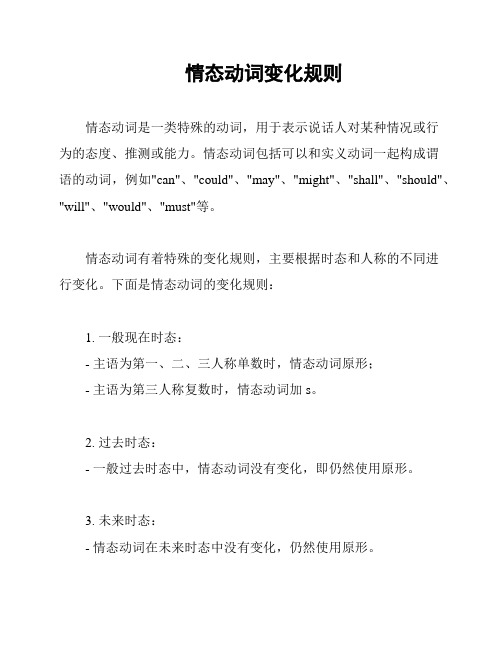
情态动词变化规则
情态动词是一类特殊的动词,用于表示说话人对某种情况或行
为的态度、推测或能力。
情态动词包括可以和实义动词一起构成谓
语的动词,例如"can"、"could"、"may"、"might"、"shall"、"should"、"will"、"would"、"must"等。
情态动词有着特殊的变化规则,主要根据时态和人称的不同进
行变化。
下面是情态动词的变化规则:
1. 一般现在时态:
- 主语为第一、二、三人称单数时,情态动词原形;
- 主语为第三人称复数时,情态动词加s。
2. 过去时态:
- 一般过去时态中,情态动词没有变化,即仍然使用原形。
3. 未来时态:
- 情态动词在未来时态中没有变化,仍然使用原形。
4. 否定形式:
- 情态动词的否定形式通常是在情态动词前加"not"。
5. 疑问形式:
- 在疑问句中,情态动词通常位于句首。
6. 被动语态:
- 构成被动语态时,情态动词后面接"be"动词的过去分词形式。
7. 完成时态:
- 情态动词没有自己的完成时态形式,但可以与"have"构成完
成时态。
需要注意的是,不同情态动词在不同语境中的用法也有所不同,具体用法需要根据具体语境进行判断。
以上是情态动词变化的基本规则,希望对您有所帮助。
“情态动词”完成时态的用法小结

“情态动词”完成时态的用法小结-英语论文“情态动词”完成时态的用法小结付骥(重庆市开县临江中学,重庆405408)摘要:情态动词一直是高考中的重点考查的项目,常侧重借助具体的语境来考查考生对情态动词基本用法的理解和掌握。
尤其是“情态动词”完成时态在语境中的运用是历年高考中的重点和难点。
考生在这点的理解上尤为困难,在将其归纳和理解诠释如下。
关键词:情态动词;完成时态;用法中图分类号:G633文献标识码:A文章编号:1005-6351(2013)-07-0062-01 一、情态动词的完成时(Modal verbs + have done)表示对已发生事情的推测(一)may/might have done意思是“可能做了某事”,表示对已发生事情的不太肯定的推测。
I may have given your help, but he was very busy.我也许看过这部电影,但我不确定。
Might she have read about it in the newspaper?她会不会在报纸上读到过呢?(二)must have done 意思是“必定做了某事”,表示对过去发生事情的肯定推测。
He didn’t hear the phone. He must have been asleep.他没有听到电话响,他必定是睡着了。
(三)can’t/couldn’t have done意思是“必定没有做某事” 表示对过去发生事情的否定推测。
He can’t have finished the work so soon.他不可能把这项工作完成得这么快。
二、情态动词的完成时(Modal verbs + have done)表示对已发生事情有轻微的责怪、后悔、遗憾等情感动作(1)should have done/ought to have done意思是“本该做某事而事实上却没有做”,表示对已发生事情的抱怨、责怪以及不满等感情色彩。
- 1、下载文档前请自行甄别文档内容的完整性,平台不提供额外的编辑、内容补充、找答案等附加服务。
- 2、"仅部分预览"的文档,不可在线预览部分如存在完整性等问题,可反馈申请退款(可完整预览的文档不适用该条件!)。
- 3、如文档侵犯您的权益,请联系客服反馈,我们会尽快为您处理(人工客服工作时间:9:00-18:30)。
情态动词+完成时(modal verbs + have + past participle)情态动词和动词原型连用,表示对目前或将来情况的看法或态度情态动词和完成时连用时,表示对过去情况的看法或态度。
1. should+have+过去分词表示过去“本应该┅”,实际上是说话人在表达责备,抱怨或遗憾的意思。
We should have cut away the jungle bush.我们本应该把丛林的灌木砍掉。
How I regretted the days when I had played and should have studied.我多么懊悔我把本应该好好学习的日子都玩掉了。
s houldn’t+have+过去分词表示过去“本不应该┅”而实际上做了的动作。
You shouldn’t have told anyone about it.你本来不应该告诉任何人。
They shouldn’t have left so soon.他们本来不应该去得那么早。
2. ought to + have + 过去分词表示过去“本应该┅”,相当于“should + have + 过去分词”You ought to have helped him.你本应该帮他一把。
You ought to have returned these books to the school library last week.上周你就应该把这些书还给学校图书室。
否定形式oughtn’t to + have + 过去分词= shouldn’t + have +过去分词eg. You oughtn’t to have taken his umbrella away.你不该把他的伞拿走。
He ough tn’t to have been there.他本不应该到那去。
3. must + have + 过去分词表示对过去情况的推测,译成“当时一定;想必已经;当时可能”。
What a challenge I must have been to this young teacher.对这位年轻教师来说,教我这样的学生当时一定是个巨大的挑战。
Since the ditch is full of water, it must have rained last night.因为沟里涨满了水,昨晚一定下过雨了。
表示对过去情况的否定推测时。
要用“can’t (couldn’t) + have + 过去分词”,一般不用“mustn’t + have + 过去分词”。
Joe can’t have left. I saw him just now.乔不可能离开了,刚才我还看见他了。
The party couldn’t have been successful as you had hoped.舞会不可能象你希望的那样成功。
“must + have + 过去分词”表示对过去情况推测时,反意疑问句用have (has), 有明确表示过去时间的状语(before 除外)反意疑问句用did.He must have finished his homework, hasn’t he?他准把作业做完了。
对吗?He must have attended the meeting yesterday evening, didn’t he?他昨晚上肯定参加会议了,是吗?4. may (might) + have + 过去分词表示对过去情况的推测,可用于肯定句,否定句,但不用于疑问句In return I may have been able to teach you a little about medical technique.作为报答,我也许教给了你们一点点医疗技术。
Might he have been caught and killed?他有可能被抓住杀掉了吗?might + have + 过去分词也能表示对过去的事情的可能性的推测,有“本应该┅”,含有婉转责备的意思。
You might have listened to me while I was talking to you.我对你讲话时,你应该认真听才对。
You might have let me know before you went out.外出之前,你本应该先告诉我一声。
5. can (could) + have +过去分词表示对过去情况的推测。
“can + have + 过去分词”一般多用于疑问句和否定句,不用于肯定句。
Can he have gone yesterday?难道他昨天就已经走了吗?They can’t have lost themselves in the woods, because I drew a map to them.他们不可能在森林中迷路,因为我给他们画了一张画。
Bill couldn’t have gone home this weekend. I saw him at the school ground this morning.本周末贝尔不可能回家,今天下午我还在学校操场上看见他了。
Mary can’t have gone to school. It’s Sunday.玛丽不可能去上学,今天是星期天。
在表示对过去某事的推测时,可用could/ might / may + 完成时。
They could/might/may have heard the news from smith.他们也许从史蜜斯那儿听到了这个消息。
6. need + have +过去分词表示过去“没有必要做”,但实际做了。
有责备的意思。
否定形式表示“做了本不应该做”的事You needn’t have woken me up so early. It’s Sunday today.你没有必要这么早就叫醒我,(因为)今天是星期天。
You needn't have watered the flowers, for it is going to rain.你本来不必浇这些花,因为天就要下雨了。
You needn' t have told him the news; he knew it already.你不必再告诉他这个消息,他已经知道了。
You needn't have walked up; you could have taken the lift.你没必要走着上去;你本来可以乘电梯。
didn't need to do(=I didn't have to)的“本沒有必要做也沒有做”I didn't need to go to the bank. I borrowed some money from Mary.我不必去银行--我找玛丽借了点儿钱.翻译理解以下句子:1. It must have rained last night, for the ground is wet.2. You must have been mad to speak to an animal.3. Mr. Smith can't have gone to Beijing, for I saw him in the library just now.4. Mary can't have taken your dictionary. She has gone home.5. There is no light in the room. Can they have gone out?6. There is nowhere to find them. Where can they have gone?7. He could have passed the exam, but he was too careless.8. —What has happened to George?—I don't know. He may have got lost.9. He might have given you more help, even though he was busy.10. She might have achieved greater progress, if you had given her more chances.11. Tom, you are too lazy. The work should have been finished yesterday.12. Look, Tom is crying. I shouldn't have been so harsh on him.13. I ought to have gone home last Sunday.14. You ought not to have given him more help.15. I needn't have bought so much wine — only five people came.巩固性练习:从A、B、C、D中选择最佳答案。
1.---You didn’t wait for Mr. Smith last night, did you?---No, but we ______. He didn’t return home at all.A. couldn’t have waitedB. needn’t have没有必要做但实际做了C. didn’t need to沒有必要做实际也沒有做D. should wait2.Harry ______ have won the Physics competition easily yesterday, but he gave up. A. could B. might C. should D. must3.---May I speak to your manager Mr. Smith at six o’clock tonight ?”---“I’m sorry, Mr. Smith ______ to a conference before then.”A. will have goneB. had goneC. would have goneD. has gone4. ---Tom took away my cell phone without being permitted.--- Really? I can’t imagine that he _______ have done such a thing.A. mustB. mayC. canD. should5.--- Was it Mary who made the suggestion?--- It _______ have been. I can’t remember.A. needB. mustC. shouldD. may6.The weather turned out to be fine yesterday. I _________ the trouble to carry my umbrella with me .A. should have takenB. could have takenC. needn't have takenD. mustn't have taken7.He paid for a seat, when he ______ have entered free.A. couldB. wouldC. mustD. need8.I didn’t see her in the meeting room this morning. She _______ at the meeting .A. mustn’t have spokenB. mightn’t have spokenC. can’t have spokenD. shouldn’t have spoken9.--- Hi, is that Peter Brown?---Sorry. You ______ the wrong number .A. must dialB. must have dialedC. should dialD. should have dialed10.I was on the highway when this car went past followed by a police car. They ______ at least 150 kilometers an hour .A. should have been doingB. must have been doingC. could have doneD. would have done11. He is not poor. You ____ have lent him the money.A. can’tB. needn’tC. couldn’tD. mustn’t12. There was plenty of time. You ___ have hurried.A. won’tB. mustn’tC. needn’tD. couldn’t13. I ____ here in time, but I met an old friend of mine. I stopped and talked with him for some time.A. shouldn’t have comeB. must have comeC. needn’t have comeD. could have come14. They ____ have finished the work yesterday, but it was raining hard.A. mustB. couldC. shouldD. might15. He was sent to hospital. Something _______ to him.A. must happenB. should have happenedC. could have happenedD. must have happened16. I didn’t hear the phone. I ________ asleep.A. must beB. must have beenC. should beD. should have been17. --- I rang your home yesterday. A man answered but I didn’t recognize the voice.--- On, it _________ my brother, Peter.A. must beB. must have beenC. can have beenD. might beKeys for reference:1---5 CAADD 6---10 CACBB11---15 BCDBD 16---3 BB教学反思传统的英语教学中,教师特别重视学生课堂上英语知识的消化,讲究知识点的掌握程度,教学中重视课内知识的封闭传授而轻视课内外方法的开放学习,这种传统的灌输式使学生缺乏灵活性和创造性。
